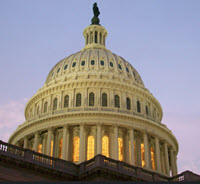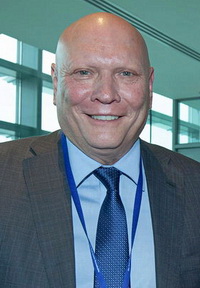Lawmakers return to Washington next week for a Lame Duck session after midterm elections that secured Democratic control of the House in January. Policymakers will immediately face a Dec. 7 deadline to fund parts of the government that may collide with President Trump’s goal to fund a border wall on the Mexican border – a possible impasse that could threaten a partial government shutdown.
 |
Lawmakers return to Washington next week for a Lame Duck session after midterm elections that secured Democratic control of the House in January. |
- Senate Majority Leader Mitch McConnell (R-KY) this week cautioned against a possible shutdown. "75 percent of the government got funded before the end of September and we all know we need to work together here at the end to finish that up. So we're going to do the best we can to achieve the president's priorities. And hopefully we won't be headed down that path," McConnell said. (Politico, Nov. 7)
- Several immigration programs (including the EB-5 investment program) are scheduled to expire on Dec. 7 unless Congress pursues its typical course and extends them as part of the next government funding measure. However, Congress also faces a Nov. 30 funding expiration for the National Flood Insurance Program.
- Other major legislation is not expected to pass during the Lame Duck, although President Trump and Democrats have recently expressed interest in working together on an infrastructure package (CNBC, Nov. 7). Congress may also consider a tax bill with technical corrections and an extension for expiring tax breaks that could carry over to the new year.
- Beyond the Lame Duck, it is expected that both parties in the 116th Congress will introduce legislation to maneuver for public favor affecting the 2020 presidential campaign. (AP, Nov. 7)
 |
Roundtable President and CEO Jeffrey DeBoer said, "We believe we will continue to be successful in Washington – regardless of which party controls the power levers – by maintaining our focus on smart research; strong political relationships; and our long-standing positive bipartisan approach to advocacy that emphasizes commercial real estate's contributions to job creation, communities, retirement savings and overall economic strength." |
- A new Congress will also bring Democratic control of House committees and a substantial new policy dynamic. Extensive hearings on last year's tax overhaul are expected from the new chair of the House Ways and Means Committee Richard Neal (D-MA), the long-standing leader of the House Real Estate Caucus.
- Nancy Pelosi (D-CA), who served as Speaker of the House from 2006-2011 and is favored to re-assume that role, stated her caucus plans to revive a "Select Committee on Energy Independence and Global Warming" that will lend heightened focus on risks and impacts from climate change and extreme weather events. (The Hill, Nov. 8.)
- It is also possible that GSE reform and a focus on housing issues could gain traction in next year's House Financial Services Committee, which will be led by incoming Chair Maxine Waters (D-CA). Her committee will also consider reauthorization of the federal terrorism insurance program.
- GlobeSt reported this week there "is one piece of must-pass legislation for the CRE industry that will require bipartisan support – the Terrorism Risk Insurance Act, which is set to expire at the end of 2020. This law impacts most business properties and is a key to transactions and refinancing. Without a doubt it has to be extended." (What A Divided Government Means For CRE, Nov. 7)
The new dynamic of a divided Congress will refocus the commercial real estate industry on its policy agenda. Roundtable President and CEO Jeffrey DeBoer said, "The Real Estate Roundtable will maintain its steady course. We believe we will continue to be successful in Washington – regardless of which party controls the power levers – by maintaining our focus on smart research; strong political relationships; and our long-standing positive bipartisan approach to advocacy that emphasizes commercial real estate's contributions to job creation, communities, retirement savings and overall economic strength."
The Roundtable will hold its State of the Industry Meeting on January 29, 2019 in Washington, DC.

